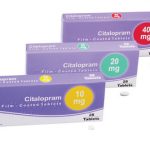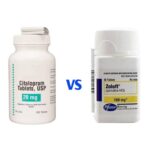How Does Citalopram (Celexa) Make You Feel At First?

What is citalopram?
Citalopram oral tablet and oral solution is a prescription drug that’s available as the brand-name drug Celexa. It’s also available as a generic drug. Generic drugs usually cost less. In some cases, they may not be available in every strength or form as the brand-name version.
Citalopram is used to treat depression. It may be used as part of a combination therapy. This means you may need to take it with other medications.
How citalopram (Celexa) works
Citalopram is part of the antidepressant drug class called selective serotonin reuptake inhibitors (SSRIs). A class of drugs is a group of medications that work in a similar way. These drugs are often used to treat similar conditions. SSRIs act in your brain to increase levels of a substance called serotonin. Having more serotonin in your brain can improve symptoms of depression.
How should Citalopram (Celexa) be used?
Citalopram comes as a tablet and a solution (liquid) to take by mouth. It is usually taken once a day, in the morning or in the evening, with or without food. Take citalopram at around the same time every day. Follow the directions on your prescription label carefully, and ask your doctor or pharmacist to explain any part you do not understand. Take citalopram exactly as directed. Do not take more or less of it or take it more often than prescribed by your doctor.
Your doctor may start you on a low dose of citalopram and gradually increase your dose, not more often than once a week.
It may take 1 to 4 weeks before you notice the full benefit of citalopram. Continue to take citalopram even if you feel well. If you suddenly stop taking citalopram, you may experience withdrawal symptoms such as mood changes, irritability, agitation, dizziness, numbness, tingling or electric shock-like sensations in the hands or feet, anxiety, confusion, headache, tiredness, nausea, sweating, shaking, and difficulty falling asleep or staying asleep. Do not stop taking citalopram without talking to your doctor. Your doctor will probably decrease your dose gradually.
What Happens If I Miss A Dose Of Citalopram (Celexa)?
If you miss a dose of citalopram, take it as soon as you remember, unless it is closer to the time of your next dose. Discuss this with your health care provider. Do not double your next dose or take more than what is prescribed.
What Should I Avoid While Taking Citalopram (Celexa)?
Avoid drinking alcohol or using illegal drugs while you are taking antidepressant medications. They may decrease the benefits (e.g., worsen your condition) and increase adverse effects (e.g., sedation) of the medication.
What Happens If I Overdose With Citalopram (Celexa)?
If an overdose occurs, call your doctor or 911. You may need urgent medical care. You may also contact the poison control center at 1-800-222-1222.
A specific treatment to reverse the effects of citalopram does not exist.
How does citalopram (Celexa) make you feel at first?
Like other antidepressants, citalopram works differently for everyone. When you take citalopram for the first time you are likely to experience a diminished level of appetite and likely start losing weight. Anecdotal evidence reveals that some people who took the drug for the first time slept about 12 hours a day and were sluggish, tired but more social, and less anxious/depressed.
Some people may experience headaches, fatigue, and mild stomach upset, but these side effects often diminish in the first few weeks as the body adjusts to citalopram.
When do you start to feel better on citalopram (Celexa)?
Taking citalopram at lowered dose or taking it at a different time of day may make the experience a lot better. Also, understand that antidepressants like citalopram don’t work immediately. Some people expect them to work within days, but it can take 4-6 weeks to feel their full effect.
What are the other possible side effects of citalopram (Celexa)?
Get emergency medical help if you have signs of an allergic reaction: skin rash or hives; difficulty breathing; swelling of your face, lips, tongue, or throat.
Report any new or worsening symptoms to your doctor, such as: mood or behavior changes, anxiety, panic attacks, trouble sleeping, or if you feel impulsive, irritable, agitated, hostile, aggressive, restless, hyperactive (mentally or physically), more depressed, or have thoughts about suicide or hurting yourself.
Call your doctor at once if you have:
• a light-headed feeling, like you might pass out;
• blurred vision, tunnel vision, eye pain or swelling, or seeing halos around lights;
• headache with chest pain and severe dizziness, fainting, fast or pounding heartbeats;
• severe nervous system reaction–very stiff (rigid) muscles, high fever, sweating, confusion, fast or uneven heartbeats, tremors, feeling like you might pass out;
• high levels of serotonin in the body–agitation, hallucinations, fever, fast heart rate, overactive reflexes, nausea, vomiting, diarrhea, loss of coordination, fainting; or
• low levels of sodium in the body–headache, confusion, slurred speech, severe weakness, vomiting, feeling unsteady.
Common side effects may include:
• changes in weight; or
• cold symptoms such as stuffy nose, sneezing, sore throat;
• difficulty having an orgasm.
• dry mouth, increased sweating;
• fast heartbeats, feeling shaky;
• headache, drowsiness;
• increased appetite, nausea, diarrhea, gas;
• numbness or tingling;
• problems with memory or concentration;
• sleep problems (insomnia), feeling tired;
This is not a complete list of side effects and others may occur. Call your doctor for medical advice about side effects. You may report side effects to FDA at 1-800-FDA-1088.
Citalopram may interact with other medications
Citalopram oral tablet can interact with other medications, vitamins, or herbs you may be taking. An interaction is when a substance changes the way a drug works. This can be harmful or prevent the drug from working well.
To help avoid interactions, your doctor should manage all of your medications carefully. Be sure to tell your doctor about all medications, vitamins, or herbs you’re taking. To find out how this drug might interact with something else you’re taking, talk with your doctor or pharmacist.
Examples of drugs that can cause interactions with citalopram are listed below.
Drugs that increase serotonin levels
A possibly life-threatening condition called serotonin syndrome can occur when citalopram is used with other drugs that can increase serotonin levels in your body. This may be more likely when one of the drugs is first started or after dose increases. Examples of these drugs include:
• buspirone
• fentanyl
• linezolid
• lithium
• medications for migraines called triptans:
o almotriptan
o sumatriptan
o zolmitriptan
• amphetamines:
o dextroamphetamine
o amphetamine
o lisdexamfetamine
• methylene blue
• tricyclic antidepressants:
o amitriptyline
o imipramine
o nortriptyline
• monoamine oxidase inhibitors (MAOIs):
o isocarboxazid
o phenelzine
o selegiline
o tranylcypromine
• tramadol
Drugs that affect heart rhythm
Citalopram shouldn’t be used with other drugs that affect your heart rhythm. Taking both citalopram and these drugs may increase your risk of heart rhythm changes that could be dangerous. Examples of these drugs include:
• chlorpromazine
• moxifloxacin
• pentamidine
• pimozide
• procainamide
• quinidine
• sotalol
• thioridazine
Drugs that increase bleeding risk
Citalopram and other antidepressant medications may increase your risk for bleeding or bruising, especially if you’re also taking other medicines that increase bleeding risk.
Other drugs that increase your risk for bleeding include:
• blood thinners:
o warfarin
o enoxaparin
o dalteparin
o heparin
• nonsteroidal anti-inflammatory drugs:
o naproxen
o ketorolac
• aspirin
Tricyclic antidepressants (TCAs)
Caution should be used when using citalopram with a TCA. This can result in higher levels of TCA in your body and more side effects. Tricyclic antidepressants include:
• amitriptyline
• imipramine
• nortriptyline
Drugs that cause sedation or drowsiness
Taking citalopram may increase the effects of drugs that cause sedation or drowsiness. Examples of these drugs include:
• diazepam
• midazolam
• zolpidem
Cytochrome P450 2C19 inhibitors
Cytochrome P450 2C19 is a protein in our body that often helps to break down drugs, including citalopram. Some drugs are known to slow down, or inhibit, the actions of this protein. When citalopram and drugs that slow down the actions of this protein are taken together, it may result in an amount of citalopram in your body that is too high. Examples of cytochrome P450 2C19 inhibitors include:
• cimetidine
• chloramphenicol
• fluvoxamine
• modafinil
In deciding to use a medicine, the risks of taking the medicine must be weighed against the good it will do. This is a decision you and your doctor will make.





